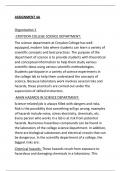Other
Unit 4A Laboratory techniques and applications
- Institution
- PEARSON (PEARSON)
This is the first assignment for unit 4, applied science (the new specification). I got a distinction for this assignment, so you will be able to use this to help you write your own, and get the same grade .
[Show more]



